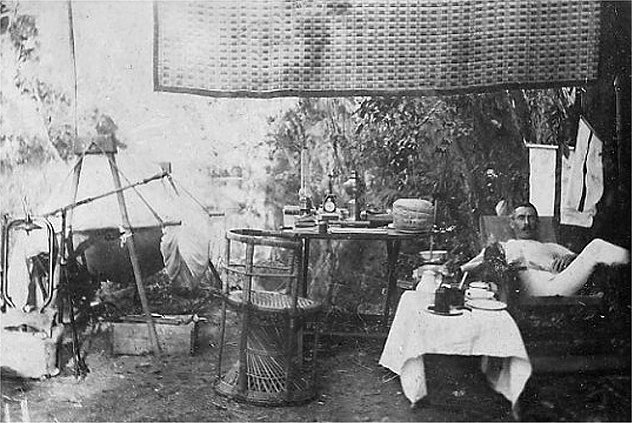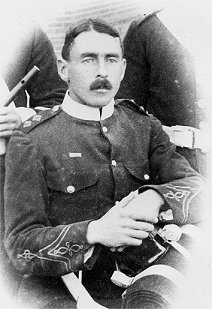Lieut.-Colonel Hugh de Berdt HOVELL, D.S.O.
Commanded the 1st Battalion Worcestershire Regiment from March 1907 to July 1908.
Commanded the 2nd Battalion Worcestershire Regiment from July 1908 to March 1913.
Commanded the 13th Battalion Worcestershire Regiment from November 1914 to April 1915.
Hugh De Berdt Hovell was born in Hackney, London in 1863, third son of Dennis De Berdt Hovell a Surgeon & General Practitioner, of Elstree Holt, Boreham, Hertfordshire, a family of ancient lineage. Hugh Hovell was educated at Winchester College, where he was a student of electricity, and the Royal Military College, Sandhurst, and commissioned in to the Worcestershire Regiment in 1884. In his Who’s Who entry, Hovell claims to have originated the use of telephones on rifle ranges (1886) and the use of field telephones (1888). In 1892 he was awarded the Royal Humane Society’s medal for rescuing, at great personal risk, a private soldier from drowning in a lake at Poona, in India. During his early years as an officer he studied the welfare and comfort of his men and the best methods of making them efficient soldiers. In 1895, when a captain on leave from India from the 1st Battalion of the Worcestershire Regiment, he disguised himself as a private soldier and served as such with the 2nd Battalion of the Worcestershire Regiment through the New Forest manoeuvres. This was done simply with the object of learning the life, the duties, the difficulties, and the troubles of a soldier on service, so that when in the future he came to command men on active service he should be in a position to know through what his men were going, to appreciate their troubles, to help them through their difficulties, and to make them contented. In this way he felt that he could get the best out of his men, and the country the best value for its money. He was the author of two manuals, "Soldiers' Shooting" (London: Gale & Polden, 1888) and " Soldiers' Training and Other Notes" (London: Gale & Polden, 1900). |
Lieut.-Col. H. de B. Hovell, D.S.O.
|
As a Captain he was posted to the 2nd Battalion at Malta in 1896. He took command of "A" Company on the island of Gozo. He was a very strong swimmer and one of his feats was to swim round the island, comparable to swimming the Channel. Every man of his company had to be able to swim a mile, play water polo, march well, be a marksman, do semaphore and know the Morse code, as well as handle a pick and shovel efficiently.
At 5ft. 10ins. he was powerfully built with fine facial features; he had large, piercing eyes and a quiet cultured voice. He was abstemious in his habits—only drank ale and ate only one course, meat and vegetables, at dinner. He always smoked a clay pipe. He wrote a good hand and was expert on the typewriter.
He served with the 2nd Battalion Worcestershire Regiment throughout the South African War of 1899-1902, being mentioned in despatches and awarded an immediate D.S.O. for gallantry.
At the battle of Sligersfontein, 12th February, 1900, he took command and throughout the 24 hours he led the singing to keep the men cheerful. The song was " Oh ! Lucky Jim." During the South African war he had the heavy field glasses issued to companies replaced at his own expense by Zeiss binoculars, and bought for the scouts the Zeiss monocular.
When the South African War closed he was posted home as Second-in-command of the 4th Battalion.
Lieut.-Colonel Hugh De Berdt Hovell commanded the 1st Battalion Worcestershire Regiment at Portobello Barracks, Dublin, Ireland in 1907.
In 1908 he rejoined the 2nd Battalion to command it at Ahmednagar, India. His first effort was to abolish the physical drill and introduce the Muller system. All ranks joined in heartily and it produced a fine body of men. Next he set about eliminating V.D. He gave weekly talks to all ranks in the gymnasium, and insisted on every man having in his kit a packet of " Before and After." His efforts were rewarded by a clean bill of health.
The spine pad was the next thing to be abolished. This cumbersome piece of cloth had been worn for years in India. It weighed several pounds, and he substituted a two ounce strip of coloured linen, which he personally demonstrated and it was taken into use. Each company wore a different coloured strip.
He always encouraged singing on the march as he said it expanded the lungs and kept men fit. He also encouraged reading and wrote several books himself, his best known being " Duffers Drift."
His methods were always "in advance of the times." He first, as a company officer in India, instituted precautions for his men against disease. He started the idea of distinctive marks on his men's coats, so that after a charge and "mix up" the men could be quickly distinguished and re-formation of units carried out without delay. This was adopted generally throughout the Army in France. He trained every man of his company to know and use the semaphore code of signalling and to move noiselessly by night like Indian scouts. He specially trained his officers and men to use their own initiative, and though in 1914 he had long since given up command of his battalion, this training proved valuable at Gheluvelt, when the same battalion, through the individual initiative of officers and men, saved the situation, to the glory of the Worcester Regiment.
He completed his four years in command of the 2nd Battalion in 1912. The C-in-C. India came and inspected the battalion on parade. His remarks were:
"I have never in all my soldiering seen a finer and better set-up body of men; your hospital is closed; your men are free from venereal disease, and your general efficiency is excellent. That should be good enough for any battalion commander."
No notes about Colonel Hovell would be complete without mention of his bicycle. It was a specially strong machine and only he could ride it. He used it day and night, visiting the cookhouses and the institutes daily. He was nearly always present at the men's teas. He mounted and dismounted by the step and when dismounting from a horse he used to throw his right leg forward and jump off.
Hovell trained 2nd Battalion, according to his own account, ‘on Sir John Moore’s and Sir Charles Napier’s methods of command’. His Who’s Who entry attributes the success of the Worcesters’ famous charge at Gheluvelt on 31st October 1914 to these training methods!
When First World War broke out in 1914 Hovell was on the retired list, but he soon found himself in command of the 13th (Reserve) Battalion Worcestershire Regiment, formed at Plymouth in November 1914. He also quickly found himself in trouble. His behaviour became the source of rumour among the rank and file, two of whom complained about him. The Times’ account of the libel case, on 6th May 1920, reported that:
"Early in December, 1914, rumours were rife that private soldiers were making indecent suggestions about the conduct of the plaintiff, and these rumours continued. A court of inquiry was ordered, and of the two private soldiers who gave evidence one tried to commit suicide."
The President of the Court was Colonel Percy Holland. The conclusion of his report was as follows:
"The Court having most carefully considered the evidence brought before them are of opinion that although they do not consider there is any ground for specific charges such as suggested by the allegations made by Privates Fletcher and Baugh regarding Colonel Hovell, at the same time they are of opinion that Colonel Hovell is undoubtedly eccentric in his manner and methods in dealing with his men, and that these peculiarities of his in conjunction with the treatment rendered necessary to his back are liable to misconstruction."
As a result of the report, Hovell was removed from his command and returned to the retired list. He sought to retrieve his reputation and in 1915, at the age of 52, he enlisting secretly under an the assumed name of Hugh Nash as a private soldier in his old battalion (2nd Battalion Worcestershire Regiment). He joined the 2nd Battalion on the 18th May 1915, with a draft of men after the Battalion's night attack at Festubert, joining at the village of Les Harisoirs. He was posted to 'A' Company. He served with his ‘old comrades’ in France for five months until his health broke down.
In May 1920 Hovell’s claim that Colonel Percy Holland had libelled him in the report of the inquiry came to trial. Holland’s counsel, the Attorney-General, successfully argued that a Court of Inquiry was privileged and that Hovell had suffered no real harm, being stripped neither of his rank, nor his DSO, nor his pension. The judge found for the defendant with costs.
Lieutenant-Colonel Hugh De Berdt Hovell, D.S.O., died from broncho-pneumonia on the 27th November 1923, aged 60.
The Worcestershire Regiment history describes him as a remarkable soldier whose versatile eccentricity has inspired countless legends in the Regiment, he became known as "Mad Jack" . However, he was a gallant soldier and a true patriot.

Hugh De Berdt Hovell seen here resting during the Boer War in South Africa (1900)
(At the time Hovell was a Captain with 'A' Company of the 2nd Battalion Worcestershire Regiment)

